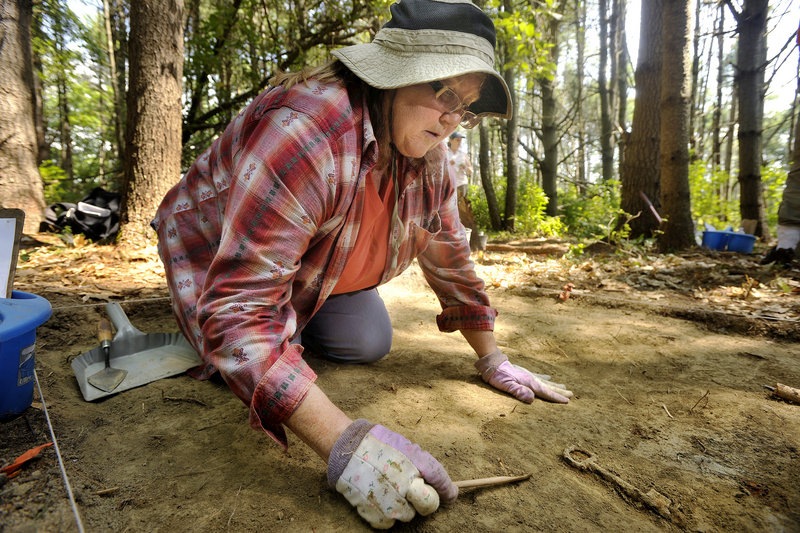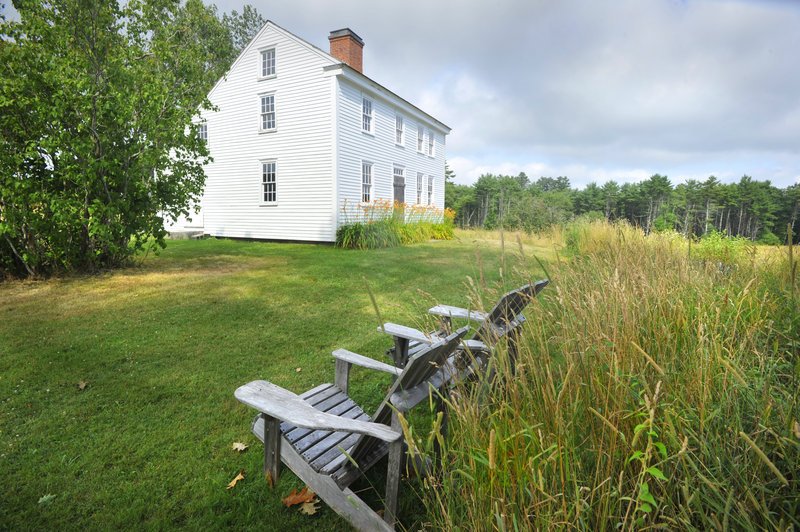FREEPORT – Mary Cook stopped scraping the compacted soil with a small trowel and calmly announced her discovery, struggling to contain her excitement.
“It’s a buckle,” she said, her face hidden by the brim of a field hat. “A buckle, a buckle, a buckle.”
Cook’s colleagues gathered around and she continued uncovering the rusted iron object, found Tuesday afternoon during an archaeological dig at the former Abraham Grant farmstead.
As more of the object became visible, it appeared that Cook, a retired business owner who lives on Orrs Island, actually might have discovered an old horse bit. She kept on scraping and eventually determined that it was, in fact, a key, lost more than 200 years ago and found just 4 inches beneath the forest floor.
“It’s a huge key,” Cook concluded. “It’s the coolest thing we’ve found yet.”
Cook is one of 10 adults participating this week in the first archaeological field school hosted by the Freeport Historical Society. The dig is taking place on Grant’s Point, where one of the town’s earliest residents lived in the late 1700s and early 1800s.
The point is part of the 140-acre Pettengill Farm property — off Flying Point Road, on the eastern shore of the Harraseeket River — which is owned and managed by the historical society.
The dig is part of the society’s summer-long program, “Diggin’ History: Piecing Together Pettengill Farm’s Past,” which includes an exhibit of discoveries from past digs, weekly activities for children and archaeological tours of the farm.
The dig started Monday at a remote site about a quarter-mile beyond the quaint, white 1810 saltbox that is the centerpiece of the farm. It’s continuing work done in the 1990s by archaeologist and teacher Norm Buttrick, who led Freeport High School students in finding evidence of a succession of houses on Grant’s Point.
Participants in the field school paid $335 for the week or $100 per day. Still, they consider themselves volunteers, helping the historical society fulfill its mission to learn more about the farm as they each fulfill a desire to be on the front lines of digging up history.
They’re working on hands and knees, in designated squares, alone or in pairs. They include Jon Tyndall of Durham, who’s on vacation from his job at a Georgetown boatyard, and Stanley Dobson of Portland, who’s newly retired after 25 years at B&M Baked Beans.
“It’s very fun, pulling up old stuff and wondering where it came from,” Dobson said, his white T-shirt covered in soil and sweat. “It piques the imagination a little bit. We’ve found shards of bottles and pieces of pipe stems. You can imagine someone sitting here by a fire, having a drink and enjoying the view.”
The dig is being overseen by Peter Morrison, a Freeport archaeologist who has worked at major historical sites such as Popham Colony, Fort Knox in Prospect and Fort Pentagoet in Castine. He and his wife, Pam Crane, also an archaeologist, are excavating a 1749 tidal grist mill on a tributary of the Kennebunk River for the Kennebunkport Conservation Trust.
“One of the nice things about the Grant site is that it hasn’t been occupied since the early 1800s, so things haven’t been moved around, dug up or disturbed,” Morrison said.
It’s also a pleasure, he said, to work with eager would-be archaeologists, who relish each hand-forged nail and every sliver of pottery that’s being scraped from the ground and sifted from buckets and buckets of earth.
“There’s no one out here who’d rather be somewhere else,” Morrison said.
The dig site is where Abraham and Susannah Grant lived with their family from the 1780s or earlier. A deed indicates that he bought the property in 1791 from Benjamin Parker, who lived in what is Yarmouth today.
Scattered bricks and granite foundation stones uncovered in the 1990s show that Grant built a house at some point that measured about 30 feet by 30 feet. Items being discovered this week were likely tossed out the back door into a rubbish heap.
By Friday, with any luck, Morrison and his crew might discover the padlock that fits the 5-inch-long key discovered by Cook on Tuesday afternoon.
“We’ll let you know if we do,” Morrison said.
Staff Writer Kelley Bouchard can be contacted at 791-6328 or at:
kbouchard@pressherald.com
Send questions/comments to the editors.




Success. Please wait for the page to reload. If the page does not reload within 5 seconds, please refresh the page.
Enter your email and password to access comments.
Hi, to comment on stories you must . This profile is in addition to your subscription and website login.
Already have a commenting profile? .
Invalid username/password.
Please check your email to confirm and complete your registration.
Only subscribers are eligible to post comments. Please subscribe or login first for digital access. Here’s why.
Use the form below to reset your password. When you've submitted your account email, we will send an email with a reset code.